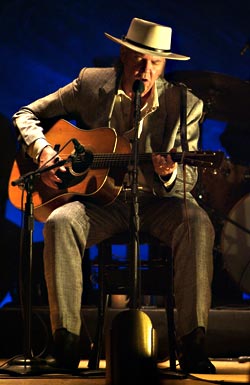Jonathan Demme’s film of a two-night Neil Young concert at Nashville’s sacred, stained-glass-enhanced, Grand Ole Opry–hosting Ryman Auditorium is the opposite of Young’s own 2003 writer-director debut, Greendale, and also the opposite of Demme’s storied 1984 Talking Heads film, Stop Making Sense. (Neil Young: Heart of Gold opens Friday, Feb. 17, at the Meridian.) Greendale was shot with an underwater camera and a script, half-translated from Young’s subconscious, about some dear hearts and rural people menaced by an Enron-esque corporation’s bad values. The tunes were as shapelessly lovely as the story and imagery, with catchy lyrics about saving the Earth, honoring wise dads, forgiving trigger-happy dumb pothead sons, defying corrupt authority, and cherishing old ladies and beautiful young idealistic girls who express their innermost souls by dancing their booties off in the attic.
Unlike Greendale, Gold is utterly focused and instantly intelligible, the Platonic ideal of a Neil Young show at his countrified ungrungiest (see interview with Young and Demme). The lyrics are his simplest yet, dashed off and first recorded for his new album, Prairie Wind,just before he endured surprise brain surgery for nine aneurysms, one of them distorting his blood-vessel wall into a shape resembling Florida. Like Dylan before recording the late masterpiece Time Out of Mind, he really thought he might be meeting Elvis.
Stop Making Sense was arty, its auteur not so much Demme as it was the Rhode Island School of Design–spawned lead singer and neo-kabuki actor David Byrne. The film was steam-cleaned of rock-show clichés—no flashpots or crowd shots with clicked Bics piously upheld like Liberty’s torch—but it was so stagey, with all the funny suits and physical tics and projected nonsense words, that you almost forgot Byrne’s big vocal influence was plainspoken Hank Williams.
Unlike Talking Heads, Young would never include a line like, “as we get older and stop making sense,” because for the past decade or two, his Alzheimer’s- afflicted dad was doing just that. His death, and Neil’s near-hit-and-run by time’s winged chariot, inspired Prairie Wind, lit with long, autumnal yellow sinking sun rays striking the pungently turned earth of his Canadian prairie memories. The feel and the melodies are much in the spirit of 1972’s Harvest and its 1992 reprise, Harvest Moon, only they’re even more spectral—like a tenderhearted ghost pouring out his love of life. Instead of celebrating dislocation à la Byrne, he sings, “Trying to remember what my daddy said/Before too much time took away his head/He said we’re going back . . . back to the old farmhouse.” These songs soar on a warm wind, a sentimental journey home. Like T.S. Eliot, Young had an old man’s mind-set at 24. In their 60s, both men sound jauntier, younger, yet preoccupied by eternity. Young now looks more dapper than usual in a nattily retro, not-too-big suit and cowboyish hat. Legendary for being evasive (this is the guy who quashed Cameron Crowe’s Rolling Stone cover story, inspiring Almost Famous, and almost suppressed his definitive bio, Shakey), here he’s open, expansive, wry. “I used to write songs like this about girls my own age,” he muses before crooning “Here for You,” about his 24-year-old daughter who’s flown the nest. In this performance, he’s here for us, present in a way he’s seldom been in public.
Demme does a self-effacingly wonderful job of capturing the perfectly lit, sonically impeccable concert. His style reminds me of St. John of the Cross’ definition of the ideal soul as one that is perfectly transparent of personality, so as to let divine light shine through unimpeded. Eight cameras in the auditorium plus one roving Steadicam caught the shows. Demme’s editing gives you the best seat in the house—that of a hummingbird hovering precisely where you most want to be for each note, leisurely zooming in on a soulful vocal or guitar solo, panning back to see Young’s subtle communication with the rest of the band (particularly his backup-singer wife, Pegi) or cracking wise between tunes. Looking at the remarkable array of talent in the lineup, he quips, “Is there a guitarist in the house?” Every one of the 35 musicians, from horns to pedal steel to the guy who plays the broom percussion on “Harvest Moon,” aces every note and fuses into ensemble perfection.
Probably the most important thing Demme contributed was the suggestion that, at under an hour, the new Prairie Wind songs don’t make a movie, and some oldies might do. Young contributes definitive performances of some of his best: “Old Man,” “Heart of Gold,” “Old King,” “Needle and the Damage Done, “Comes a Time,” and the elegiac anthem he made famous, “Four Strong Winds.”
To be pitilessly fair, the new songs do not hit the high-water mark of the old songs. But they do complement them in a satisfying way. Harvest and Harvest Moon were also done in Nashville at times when Young suffered health crises, and Prairie Wind doesn’t just echo their themes, it continues and deepens them. No matter how old a soul you are at 24, you sing “Old Man” differently when you’ve lost your old man and gazed through death’s door from the welcome mat. And you write with a sense of yourself as a transitional figure, in your own life’s development and in the procession of the saints. At 24, he couldn’t have thought to sing, “This old guitar ain’t mine to keep/It’s mine to play for a while.” In the film, he plays it on Hank Williams’ actual Grand Ole Opry guitar, and hoists it up to Hank with an upcast glance.
The film confirms my steadfast conviction: Neil Young is the best old hound dog I ever did know.








